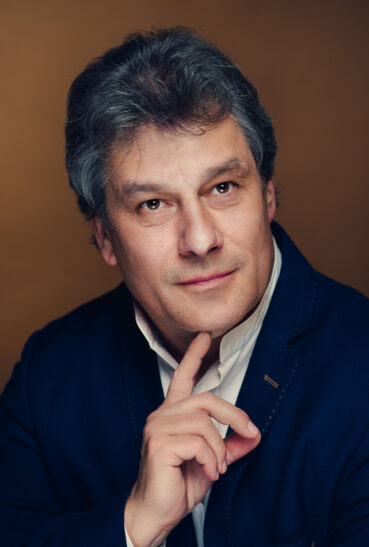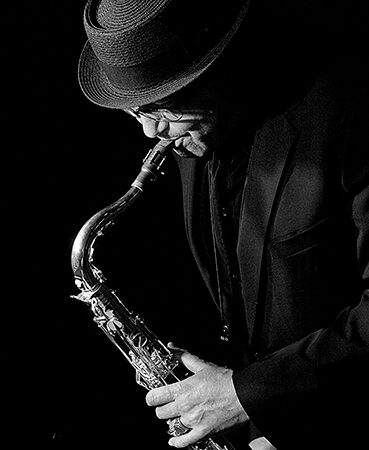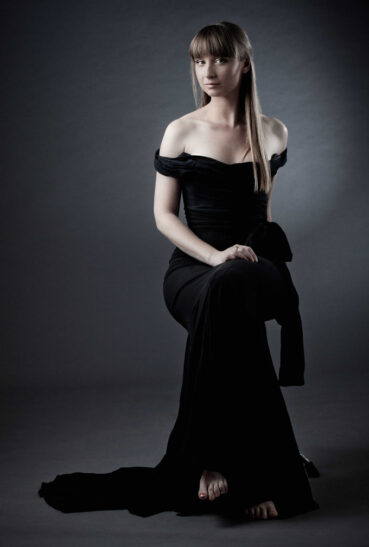DEBUSSY | MOSS | PIAZZOLLA | STRAUSS
x
29 April 2023, 7 p.m.
Witold Lutosławski Concert Studio of the Polish Radio in Warsaw
Performers
Paweł Gusnar | tenor saxophone
Alicja Śmietana | violin
Jerzy Semkow Polish Sinfonia Iuventus Orchestra
Mirosław Jacek Błaszczyk | conductor
Programme
Claude Debussy – Petite suite (arr. Henri Büsser)
Piotr Moss – Concerto malinconico for tenor saxophone and orchestra PREMIERE
***
Astor Piazzolla – Las Cuatro Estaciones Porteñas (arr. Leonid Diesiatnikow)
Richard Strauss – Till Eulenspiegels lustige Streiche op. 28
Mirosław Jacek Błaszczyk – photo Wojciech Mateusiak; Paweł Gusnar – photo Artist’s archive; Alicja Śmietana – photo Krystian Data
Claude Debussy completed his Petite suite for piano four hands in 1889, initiated by the Parisian publisher Jacques Durand, who wanted to offer a musical work that was ambitious and impressive, but also accessible to advanced amateurs. He also gave a preview performance with the composer. The four concise miniatures with programmatic titles (the first two inspired by Verlaine’s poems) quickly became very popular and were also performed in various chamber arrangements, and in 1907 Debussy’s friend, French composer and conductor Henri Büsser, orchestrated them in a colourful fashion (the score was also published by Durand), further increasing the cycle’s fame.
Piotr Moss is an extremely versatile composer who has lived in France for decades, but is also constantly present on Polish stages. His eagerly awaited new work, Concerto malinconico for tenor saxophone and orchestra, was written as part of the ‘Composer’s Commissions’ programme (NIMiT) exclusively for Piotr Baron. The author himself wrote the following about this inspiration: “…I reacted enthusiastically to this proposal. The saxophone has been in the orbit of my compositional interests for many years now, and the list of works I have written for this instrument is very long. The poetic interpretations of Ellington played by Piotr Baron turned my compositional thoughts towards a certain melancholy, of which the tenor saxophone plus Piotr Baron are, I think, excellent representatives. It should be added that by commissioning a saxophone concerto from a composer of classical music, Piotr Baron perhaps wanted to return to his musical roots. The composer, in turn, was curious how his music would sound when viewed through the prism of the jazz experience of this great musician. The work is in one movement, composed of several distinct episodes punctuated by intermedia, in which there is room for saxophone improvisations”. The composition will be performed for the first time by Paweł Gusnar – saxophonist, chamber and session musician, pedagogue (professor at the Fryderyk Chopin University of Music and the Grażyna and Kiejstut Bacewicz Academy of Music in Łódź since 2003) and juror of numerous musical competitions. He is a versatile artist, open to various styles and forms of expression, applauded on countless prestigious stages in Poland and other countries. He combines classical, jazz and popular music activities at an equally high level. He is a propagator of contemporary music, an inspirer and also first performer of many works by Polish composers (more than 80 works have been written for him, including 16 for saxophone and orchestra). Paweł Gusnar has recorded over 60 CDs, including nearly 20 original and co-authored ones. He has won four Fryderyks (2014, 2015, 2016, 2019) along with many other musical awards, prizes and distinctions.
Estaciones porteñas (‘The Four Seasons of Buenos Aires’) by Astor Piazzolla – a great reformer of the tango genre – are four tango nuevo pieces composed between 1965 and 1970 for various occasions (e.g. Spring – Verano porteño was written for Alberto Rodríguez Muñoz’s play Melenita de oro) and often performed separately in different arrangements by Piazzolla himself, but it was also natural to combine them into a cycle, which the author also occasionally did. Russian composer Leonid Desyatnikov made an original arrangement of the four tangos for violin and string orchestra with the intention of creating a contemporary pendant to Vivaldi’s Four Seasons (to which he playfully alludes at several points). Listeners to the April concert will hear this version performed by Alicja Śmietana, who proudly made her international debut with the famous orchestra of the Academy of St. Martin in the Fields under the baton of Sir Neville Marriner in 2003. Since then, she has worked as a soloist with many world-renowned orchestras and chamber ensembles – including the Berlin Philharmonic and Simon Rattle. Earning the respect of many distinguished musicians, she has worked with Gidon Kremer, Nigel Kennedy, Ivan Monighetti, Yuri Bashmet, Martha Argherich, Thomas Zehetmair and other distinguished artists. She has won numerous international competitions, prizes and scholarships. She also moves freely in other genres, performing a lot of experimental music, electronic music, elements of jazz and other genres of contemporary music.
Completed in spring 1895, the scherzo type tone poem Till Eulenspiegels lustige Streiche by Richard Strauss, based on the popular stories about the mischievous goliard published in the 16th century (the author originally intended to dedicate an opera to him), was to become an emblem of the narrative and illustrative type of programme music. The protagonist is characterised by two themes, played by the horn symbolises the character of Dyl himself, while the grotesque motif of the D clarinet symbolises his mischief-making. Subsequent sound onomatopoeias, colourfully and wittily orchestrated, allow us to follow the adventures of Ulenspegel until the sad end – but also a further life in memory and song.
The conductor of the evening, Mirosław Jacek Błaszczyk, is a figure well known to listeners of Sinfonia Iuventus concerts; he is a member of the Artistic Council – the POSI’s artistic coordinator. He has managed the State Symphony Orchestra in Zabrze, the philharmonics in Białystok, Poznań and the Silesian Philharmonic (he managed it successfully for two decades), and his concert output includes an impressive number of performances and recordings with the most important national and international ensembles. Since 1999, he has been the artistic director and juror of the Grzegorz Fitelberg International Competition for Conductors in Katowice (as well as many other important conducting competitions). [pmac]
Standard price of the tickets: 45 zł/1 seat
Reduced price of the tickets: 35 zł/ 1 seat
for:
• students, students before 26, pensioners and the persons after 70,
• students of the schools of music and ballet as well as the students of the universities of music and musicology departments
Tickets: Polskie Radio – Bilety24, eBilet as well as the ticket box of Witold Lutosławski Polish Radio
Organiser: Jerzy Semkow Polish Sinfonia Iuventus Orchestra
The organiser reserves the right to change the programme or the performers of the concert
Media patronage: TVP Kultura, Presto, polmic.pl
x



